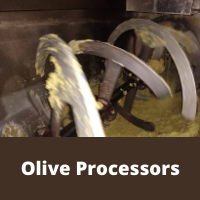Notwithstanding the modernity of Australia’s olive oil production, like all agricultural activities, it is fundamentally ruled by the elements.
There is no escaping the seasons, just as there is no escaping the need to maximise the chances of a good crop by proper husbandry and modern and efficient production methods.
This year’s olive harvest is well past the halfway mark and it is clear that nature has disappointed some olivegrowers, particularly those whose crops were affected by drought and hot winds during flowering and by frost. Reports say that
harvests have been poor in Queensland and New South Wales with some olivegrowers in New South Wales left without a crop this year.
Harvest results in South Australia and Victoria appear patchy and the good harvest news of the season comes from Tasmania and Western Australia where again it is the elements which appear to have made the difference with water and better flowering conditions. As the end of harvest approaches the focus shifts to marketing. Although in world terms Australia is still a small player it is becoming a consistent small olive oil player and therefore needs consistent markets.
The flagship marketing pitch is for the export of quality oil. However, growing concern about greenhouse emissions and their impact on climate change may affect markets.
The British Government has already flagged a proposal to voluntarily put “carbon footprint” labels on all products. Under the scheme products will display labels showing the greenhouse gas emissions created by their production, transport and eventual disposal, similar to the calorie or salt content figures on food packaging.
Recently the UK’s inf luential Soil Association cast doubts about the merits of imported organic produce because of concern that air freighting is the most expensive and most environmentally damaging mode of transporting food.
One per cent of food consumed in the UK is air freighted and is responsible for 11% of the total food transport CO2 emissions, according to the Soil Association.
The UK estimates that the environmental, social and economic costs of ‘food miles’ are more than £8 billion each year and the Government has set up a ‘Red Tractor’ labeling scheme. Businesses, from farms to distributors, who have
worked to improve quality while reducing greenhouse gas emissions, wear the ‘Red Tractor’ label to promote their efforts to consumers.
If this is an indication of the trend in consumer awareness about climate change risks and government responses then it may cause a review of marketing strategies. It may make local and domestic olive oil markets more competitive once the ‘carbon footprint’ is factored in the cost of putting extra virgin olive oil on the table.


